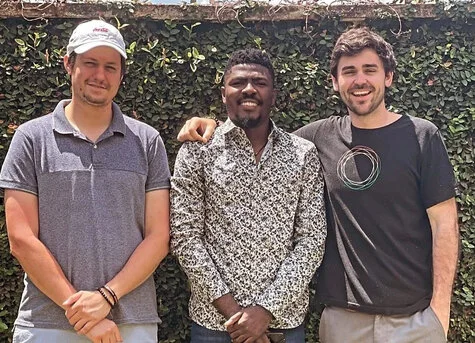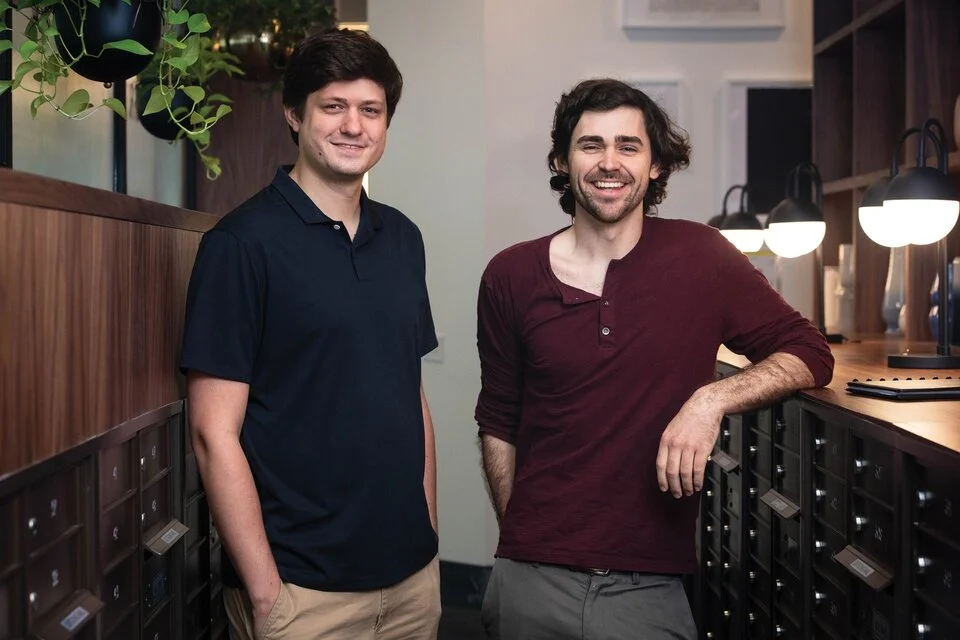Chris Maurice and Justin Poiroux ventured into cryptocurrency trading just to make a little money when both were undergraduates at Auburn University, Alabama.
But what seemed like personal stuff grew bigger such that multi-million dollar companies took interest in what is today known as Yellow Card Financial – the owners of Yellow Card Crypto Exchange – and got a combined Series Funding of $57,000,000.

They both grew their passion for the new Internet of Money to the point of becoming part of the pioneer participants in what is now known as the New Venture Accelerator (NVA) at Harbert College of Business, Auburn University.
The Yellow Card, which now operates in 20 countries in Africa – and still eyeing more – started in 2018 and officially went live in Nigeria in June 2019, Africa’s biggest crypto market, and has facilitated over $2 Billion in transactions across the continent.
So, how did Chris and Justin start Yellow Card? How were they able to raise $57 million from Jack Dorsey’s Block and other venture capital that believed in their vision?
What Yellow Card has achieved today can be described unrelenting efforts of Chris Maurice and Justin Poiroux to achieve their dream, despite the challenges they faced during their crypto-learning process.
How Chris and Justin got involved in cryptocurrency
In an interview he granted to the press crew of Harbert College of Business of Auburn University, Chris described the beginning as extremely challenging but kept his eyes on the goals.
He alluded to how the entrepreneurship support services and extended network of his alma mater played in their business growth.
According to the CEO of Yellow Card, many opportunities in Bitcoin excited him when during one his findings he stumbled upon a post on eBay where Bitcoin was being sold for a 150% markup. This happened during his studies.
Chris called his confidant and friend, Justin, telling him, “I know how to use eBay and you know Bitcoin, so let’s make some money here.”
Made Their Profits From Bitcoin Trading
They both strategized and listed Bitcoin on the e-commerce site. The sales they followed their actions – did $10,000 in sales the first day – at a 100% mark-up. They were excited.
To their astonishment, they generated over $40,000 in sales.
According to him, he was planning to quit his undergraduate studies to face cryptocurrency trading full-time, “and I’m getting ready to call my mom to tell her that I’m dropping out of school,” he said.
Lost their first profits to a credit card scam
While it sounded easy, it was more than that because they both lost their first profits to credit card scams.
Unknown to them, their first week sales spree was as a result of credit card scams being perpetrated by some bad guys online, “then using those numbers to buy Bitcoin from us.”
That was when Chris learned that cryptocurrency transactions were irreversible. The loss eroded the profits they made in their first week.
But they would not allow the losses to deter them. They posted another set of ads online, this time on Craigslist and the now defunct LocalBitcoins, urging interested Americans to fix a physical location where they could trade Bitcoin with fiat currency.
Explaining how it the idea was implemented, Chris explained, “We let it be known that every Wednesday at 7:00 p.m. you could meet with us at a fast-food restaurant in Auburn, and we’d be sitting in a back booth taking cash and assigning Bitcoin to buyers’ QR codes on their phones.”
Support from New Venture Accelerator (NVA)
From their experiment of the one-on-one meeting for crypto trading, it was time to package the idea into a viable entrepreneurship idea that could get financial support from venture capital.
But this won’t come without a presentation and pushing forward a convincing business plan, this is where the New Venture Accelerator (NVA) at Auburn’s Harbert College of Business came in.
In providing the needed entrepreneurship motivation to scale their idea and turn their idea into a global product, some of their lecturers came in handy.
Chris specifically mentioned Dr. LaKami Baker, Lou Bifano, Cary Chandler, Scott McGlon for providing resources for them, from crafting an investor pitch and how to deliver it.
During the investor pitch competition, Chris painted a picture on how he slept in the office along with Justin preparing for the competition ahead and how they rehearsed four to five days ahead before Dr Baker and others and took feedback from them. “I had no clue about either—and it was a long, hard haul to learn,” he told the press crew of NVA.
They came third, winning $25,000 prize money in the competition.
The Launch of Yellow Card Exchange in Africa
Selling Bitcoin out of a network of Taco Bells on South Gay Street in Auburn then moved to an app developed by Justin. That move was the beginning of a project that simplifies transactions across Africa.
In June 2019, Yellow Card went live in Nigeria using the same Bitcoin Gift Card model both co-founders used at Auburn University.
They partnered with several shops across Lagos and others across Nigeria where buyers would purchase Gift cards that they converted to Bitcoin.
Later, they upgraded into a crypto-based agency banking business. And with the launch of Yellow Card App, it became easy and possible for a Nigerian in Canada to send $500 worth of Bitcoin to his sister back home.
All the sister needed is to download the app, send her wallet address to his brother or both of them download the YC Crypto App where transactions will take place.
The idea of making profits from crypto trading grew bigger into disrupting cross-bother payment in Africa through stablecoins such as Tether USDt, XAUt, thanks to blockchain technology, which powered cryptocurrency.
And it seems the growth and how Yellow Card App is expanding more on the continent is challenging banking sectors to come up with something similar such as the planned cNGN stablecoin token by some banks in Nigeria scheduled for launch in 2024.
In the process of having the first presence in Nigeria, the CEO met a Nigerian DeFi and blockchain enthusiast, Munachi Ogueke, on LinkedIn.
Munachi, who would become the Chief Business Officer of exchange disclosed how he convinced Chris to leave the U.S. because of the possibilities in Africa.
“We met and started out with a Yellow Card. We did a conference, we started meeting people and creating awareness about our product, and that’s how we took off.”
-according to a report by technext24.
And by June 11, 2018, Yellow Card officially registered to operate in Nigeria under the name, Yellow Card Financial Nigeria, according to its CAC record.
By June 2019, Chris touched down in Nigeria to launch Yellow Card.
From Nigeria, the company began its expansion. And later became the first cryptocurrency firm in Africa to be granted a Virtual Asset Service Provider licence to operate in Botswana, receiving a licence issued by the Non-Bank Financial Institutions Regulatory Authority (NBFIRA).
Where Did Yellow Card Get Funding From?
Having started the Yellow Card project in Africa – Nigeria as a takeoff point in June 2019 – its growth drew the attention of several Venture Capitals, including Jack Dorsey’s Block.
The company’s first venture funding was $100,000 when Chris was an undergraduate while Justin was in his off-campus apartment. The funding drew Justin’s parents’ attention.
By the time a financial boost came from Venture Capitals in 2021, the company was already boasting of a presence in 12 African countries.
By September 27, 2021, the company announced that it raised $15 million in Series A Funding to ramp up hiring and continue its expansion across Africa.
At the time, $15 million funding was the largest any African-based cryptocurrency exchange could raise, not knowing the largest was yet to come, until September 19, 2022, with another $40 million Series B Funding.
Yellow Card Funding came from:
- Valar Ventures,
- Third Prime,
- Castle Island Ventures
- Square, Inc.,
- Blockchain.com Ventures,
- DG Daiwa Ventures
- Coinbase Ventures,
- Polychain Capital,
- BlockFi,
- Fabric Ventures,
- Raba Partnership,
- MoonPay,
- GreenHouse Capital
- Sozo Ventures
- The Raba Partnership,
- Jon Weiner,
- Alex Wilson,
- Pat Duffy
How Yellow Card Makes Profits
In our review of the Yellow Card App, we mentioned that the exchange only charges 0.75% for buying and selling. That’s how they make money.
That’s quite cheaper than what banks charge when sending money to Africa from the U.S and Europe.
On average, a bank will charge 7.8% ($15.60) to send $200 to Africa, the percentage can even be as high as $38 (19%) in some countries, according to reports.
But with Yellow Card, it will only cost $1.5 (0.75%) to send the same amount to or from Africa.
Yellow Card nearly eliminated the cumbersomeness associated with financial transactions across Africa, making it possible for customers to receive crypto from any part of the World and pay only a network fee.
Their Accomplishments
Chris and Justin were featured on Forbes 30 Under 30
For their commendable efforts in bringing payment to the doorsteps of every African, who is ready to and use decentralized finance, Chris and Justin were among the young innovative minds that made Forbes 30 Under 30 in the “Big Money Startups” category.
Disrupter of the Year
In 2023, another recognition came in the way of Yellow Card as the “Disrupter of the Year” at the Africa Financial Industry Summit (AFIS), which was held on November 15, 2023, in Lome, Togo.
Featured image by Auburn Alumni Association, Auburn University

